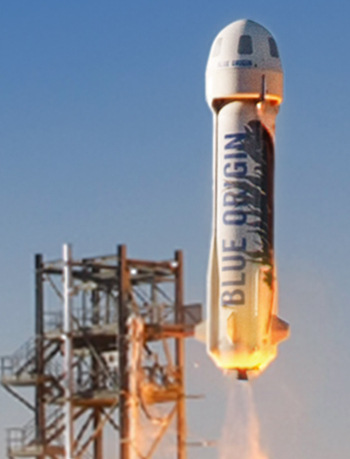Blue Origin reflies and lands New Shepard again
The competition heats up: Blue Origin yesterday successfully re-flew its New Shepard booster, vertically landing it for the second time.
Data from the November mission matched our preflight predictions closely, which made preparations for today’s re-flight relatively straightforward. The team replaced the crew capsule parachutes, replaced the pyro igniters, conducted functional and avionics checkouts, and made several software improvements, including a noteworthy one. Rather than the vehicle translating to land at the exact center of the pad, it now initially targets the center, but then sets down at a position of convenience on the pad, prioritizing vehicle attitude ahead of precise lateral positioning. It’s like a pilot lining up a plane with the centerline of the runway. If the plane is a few feet off center as you get close, you don’t swerve at the last minute to ensure hitting the exact mid-point. You just land a few feet left or right of the centerline. Our Monte Carlo sims of New Shepard landings show this new strategy increases margins, improving the vehicle’s ability to reject disturbances created by low-altitude winds.
They are not clear whether the capsule was re-flown as well. They do say they intend to re-fly New Shepard many times in 2016, probably at an increasing rate. If so, I would say that the race to be the first to sell suborbital tickets to tourists is won by Blue Origin, and that Virgin Galactic and XCOR have been left in the dust.
I have embedded the company’s video below the fold of yesterday’s flight.
» Read more
The competition heats up: Blue Origin yesterday successfully re-flew its New Shepard booster, vertically landing it for the second time.
Data from the November mission matched our preflight predictions closely, which made preparations for today’s re-flight relatively straightforward. The team replaced the crew capsule parachutes, replaced the pyro igniters, conducted functional and avionics checkouts, and made several software improvements, including a noteworthy one. Rather than the vehicle translating to land at the exact center of the pad, it now initially targets the center, but then sets down at a position of convenience on the pad, prioritizing vehicle attitude ahead of precise lateral positioning. It’s like a pilot lining up a plane with the centerline of the runway. If the plane is a few feet off center as you get close, you don’t swerve at the last minute to ensure hitting the exact mid-point. You just land a few feet left or right of the centerline. Our Monte Carlo sims of New Shepard landings show this new strategy increases margins, improving the vehicle’s ability to reject disturbances created by low-altitude winds.
They are not clear whether the capsule was re-flown as well. They do say they intend to re-fly New Shepard many times in 2016, probably at an increasing rate. If so, I would say that the race to be the first to sell suborbital tickets to tourists is won by Blue Origin, and that Virgin Galactic and XCOR have been left in the dust.
I have embedded the company’s video below the fold of yesterday’s flight.
» Read more

